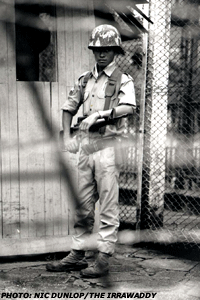The junta’s inaction leaves Rangoon open to further attacks
Absorbing the siege mentality that forms part of everyday life in Burma’s capital does not usually take a long time. Rangoon epitomizes military dictatorship: Barbed wire stretches along the walls of most residences, army jeeps and personnel carriers mingle with civilian traffic and guards cradle automatic weapons on street corners. Burma’s armed forces seem constantly on red alert.
But when Rangoon suffered its worst terrorist act since independence, with official figures claiming 23 fatalities and more than 160 wounded, many in Burma felt the Tatmadaw, the country’s military forces, was left wanting.
Sources in Rangoon say that instead of engaging with its own people, the private sector and the expatriate community to safeguard the country after May 7, the junta has resorted to haphazard security measures designed mainly to serve its own interests and thereby leaving the country open to further attack.
 A leading international airline that flies to Burma was so concerned by the government’s lack of safety measures at Rangoon International Airport that it says it made its own recommendations on tightening security. The junta ignored the suggestions, failing even to reply, prompting the airline to raise the issue with its country’s embassy in Rangoon.
A leading international airline that flies to Burma was so concerned by the government’s lack of safety measures at Rangoon International Airport that it says it made its own recommendations on tightening security. The junta ignored the suggestions, failing even to reply, prompting the airline to raise the issue with its country’s embassy in Rangoon.
Disregarding a key recommendation to allow only people with valid tickets into the terminal building, the authorities instead only increased security personnel and the use of sniffer dogs—little more than a token gesture, according to the airline.
The foreign diplomatic community in Rangoon also complains of a lack of cooperation over security issues, while offers by Thailand and the United States to assist in investigating the bombings were rejected by Rangoon.
One European diplomat said their embassy had asked for a security briefing, but was referred to a press conference by the State Peace and Development Council in Rangoon on May 19—to which it wasn’t even invited. The threat of further bombings was downplayed at the press conference, where Minister of Information Brig-Gen Kyaw Hsan said only: “As the government has made public security arrangements to the best of its ability, people can go about their daily business without having any anxiety.”
According to one foreign observer in Rangoon, security preceding Armed Forces Day in March was actually noticeably tighter than after the May attacks, leading to suggestions that the regime is perhaps more concerned about its own safety than that of the Burmese people.
Businesses and private households have been left to make their own security arrangements. City Mart, which suffered the almost total destruction of its store at Junction 8 Shopping Center, has introduced the most stringent security measures. Baggage can no longer be left at the front desk and metal detectors are being used to check customers for weapons. Many of Rangoon’s leading hotels are also screening guests and visitors.
The Ministry of Hotels and Tourism, in a bid to ease tourists’ fears, met on May 9 with 18 representatives of Rangoon’s international hotels to discuss methods for improving security, the Myanmar Times reported. The hotels in question were told to adopt their own security measures, while Burmese-owned hotels have been shunned by the government altogether.
Only in protecting school children has the government taken any significant action. The Associated Press reported at the beginning of the new academic year in early June that pupils would now be required to wear identification badges, and vehicles had been banned from parking in front of school buildings.
The lack of action by the authorities has not gone unnoticed by the Burmese press. At least one story reporting increased business for private security firms is said to have been banned by the junta’s Press Scrutiny Board.
One report said the police had urged shopping centers, restaurants and hotels to take responsibility for their own security. The report spoke of limited verbal cooperation between state security departments and the private sector.
In the existing information vacuum Burma’s rumor mill is working full-time, issuing one false alarm after another. When repeated bomb scares occurred at Yuzhana Hotel, near the National League for Democracy headquarters, on Shwegondine Road, the manager said her establishment was being confused with the Yuzhana Plaza shopping center.
Another current rumor says pamphlets are circulating in Rangoon warning of further attacks. Whether that’s true or not, there’s an uncomfortable feeling in the capital that it can be only a matter of time before bombers—perhaps emboldened by official indifference—strike again.
The Ministry of Information, the Ministry of Hotels and Tourism and the Ministry of Home Affairs, which includes the Myanmar Police Force and the Bureau of Special Investigation, all refused to comment on the issues raised in this article.

 A leading international airline that flies to
A leading international airline that flies to